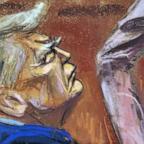Report: U.S. wins WTO films, music case vs. China
GENEVA -- The U.S. has largely prevailed in a trade dispute with China over restrictions on the sale there of American CDs, DVDs, books and computer software, two officials familiar with the ruling have told the Associated Press.
The confidential verdict from the World Trade Organization victory comes as the administration of President Obama is being pressed to be tough over trade rules with China, whom many Democrats in the U.S. Congress blame in part for America's soaring trade deficits and lost manufacturing jobs.
The ruling in the case, filed during the preceding Bush administration, was released to Beijing and Washington last month and will be made public on Aug. 12. It finds that Beijing is breaking commerce rules by forcing U.S.-made goods from magazines to video games to be sold through Chinese state-owned companies, the officials said.
But, as with most WTO rulings, the officials say the ruling stops short of a complete U.S. victory as the three-member panel delivered mixed findings on Chinese censorship rules that apply to American-made goods but not to Chinese products. It also permits China to make U.S. films go through one of two designated distributors to be shown in Chinese cinemas, a requirement not required of Chinese movies.
The officials who had reviewed the ruling spoke on condition of anonymity because of confidentiality rules ahead of publication. The Office of the U.S. Trade Representative and the Chinese Commerce Ministry have declined to comment.
The ruling will also be of interest to a variety of American media producers from Hollywood to Silicon Valley, who argue that discriminatory Chinese rules are costing American media companies millions of dollars. The dispute includes a complaint about Chinese censorship of music recording downloads in China, such as those sold by Apple's iTunes store.
The WTO can authorize retaliatory sanctions against countries unwilling to bring tariffs, subsidies and other trade practices in line with international agreements, but generally only after years of litigation. Washington and Beijing can appeal the verdict.




